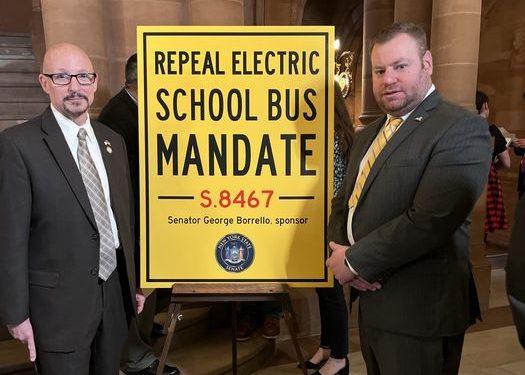Assemblyman Ed Flood discusses consequences of the state’s all-electric school bus mandate
By Aramis Khosronejad
According to the U.S. Environmental Protection Agency, “in 2022 U.S. greenhouse gas emissions totaled 6,341.2 million metric tons of carbon dioxide equivalents, and 5,487.0 million metric tons of carbon dioxide equivalents after accounting for sequestration from the land sector.” In the wake of these statistics, New York State has been searching for a way to help decrease these concerning figures.
As an aid to the process, New York’s governor, Kathy Hochul (D), presented a new mandate this past September. The state mandate will require zero-emission new school bus purchases by 2027 and for school districts to operate zero-emission school buses only by 2035.
Although on the surface the use of electric vehicles seems like an efficient and smart way of reducing our greenhouse gas contribution to the global community, there are some drawbacks and consequences that state Assemblyman Ed Flood (R-Port Jefferson) as well as other state politicians have pointed out.
Local state senators, Assembly members, fire safety and school officials gathered Feb. 25 at Levittown bus depot to a “Push the Brakes” rally on the state’s electric school bus mandate.
Flood categorized the conflicts that could arise with this new mandate in two simple categories: economic issues and the alarming lack of reliability.
According to Flood, we need only look at the numbers to be able to reach the conclusion that the economic setbacks of a mandate such as this would be potentially devastating to the academic capabilities of many school districts within New York state. To successfully and fully implement these zero-emission buses it would take “roughly $20 billion” to do so, he said.
Flood and other elected officials have also been vocal regarding the proposed state-aid school budget cuts listed in the governor’s budget proposal earlier this year. School districts will have to cut programs, camps and other academic activities and opportunities for districts whose budgets would be affected by these cuts.
Additionally, Flood has a concern for an increase in taxes if the bus mandate were to be carried through — he said that taxes in New York are already extreme without the addition of this new bus expenditure. Also, there has to be consideration for the cost of the establishment of charging stations for the buses, compounded by the stations’ running costs.
Another heavy consequence of the implementation of these new fleets of buses, and what Flood argues is significantly more important, is the question of their reliability. The most important question for Flood is “What steps are we taking to ensure the safety of our children and these bus drivers?”
It has already been observed in cities where e-buses are already in place such as San Francisco and Chicago that their batteries have problems with severe temperature fluctuations. Flood points out how the EV batteries can die quickly and may not prove efficient. In addition, EV batteries are prone to catch fire and are notoriously difficult to put out. If this were to happen while one of the buses was in use, Flood claimed that we’d be “looking at the loss of lives.”
Flood provided a potential solution to these doubts over bus batteries by bringing up the idea that “having a backup system in place could address this issue” even if this backup uses carbon. “We need a more powerful EV source than the one we have,” he said.
The main belief that Flood carried was “not saying we shouldn’t be aiming for these goals but we’re trying so hard to be the global leaders in EV that we’re looking over the health and safety concerns that it’s going to cause to all these communities.”
According to Flood, if there were a delay to this mandate, there would be sufficient time for all these concerns to be addressed and handled properly. Then, zero-emission buses would be safe to push into New York school districts, and we could do our part in making sure our planet suffers a little less.







